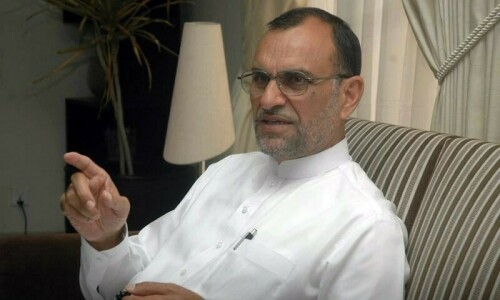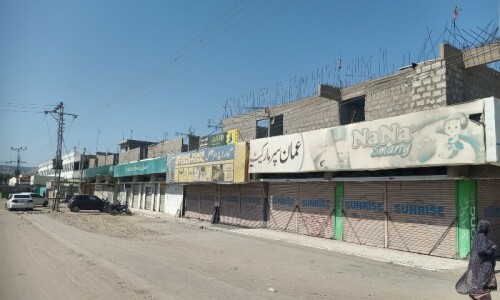• Apex court asks government to determine tenure, terms of service of COAS through legislation within this period
• Three-year tenure will not be mentioned in notification for appointment of army chief
• CJP deplores smear campaign against judiciary for taking up petition
• Says it was embarrassing to see army chief himself had to come to guide government regarding notification about extension in tenure of his service
ISLAMABAD: In what came as a breather for the federal government after three days of heightened uncertainty, the Supreme Court on Thursday allowed extension/reappointment of General Qamar Javed Bajwa, Chief of the Army Staff (COAS), for another six months.
At the same time, the apex court shifted the onus to parliament when it asked the government to determine the tenure, terms and conditions of service of the army chief through legislation within the same period i.e. six months.
In a short order announced in a packed-to-capacity Courtroom No 1, Chief Justice Asif Saeed Khosa mentioned the undertaking given by Attorney General Anwar Mansoor in a categorical manner that the earlier practice of granting extensions to the army chief which was being followed would be codified under the law by pushing legislation through parliament.
The assurances held out by the government include deleting reference to the Supreme Court’s observations and hearings in the summary for appointment of the army chief and removing from the notification mention of three-year tenure, but salary, allowances and other perks and privileges of the army chief.
The Supreme Court also exercised restraint in view of the consideration that the COAS is responsible for the command, discipline, training, administration, organisation and preparedness for war of the army and is chief executive at the General Headquarters.
“Therefore, we find it appropriate to leave the matter to parliament and the federal government to clearly specify the terms and conditions of service of the COAS through an Act of Parliament and to clarify the scope of Article 243 of the Constitution under which the government appointed Gen Bajwa. Thus the current appointment of Gen Bajwa as COAS will be subject to the legislation and will continue for a period of six months from Thursday. After this the new legislation will determine his tenure and other terms and conditions of service,” the short order said.
The SC order drew a mixed reaction. A senior counsel said it was surprising the apex court had asked parliament to adopt a particular course within a specified period. “This is against the principles of the sovereignty of parliament and the separation of powers,” he observed.
However, Pakistan Bar Council member Raheel Kamran Sheikh termed the order courageous and laudable as it had saved the institution of the army from being completely vulnerable to political manoeuvring and absolute control in perpetuity by those powerful individuals who occupied the chief’s slot at any given time.
“At the very minimum, it is a serious and effective attempt to extend the rule of law and its application to the process of appointment of the most powerful position in this country,” he said, adding that at best the order created another chance for the polity to renegotiate the powers of appointment, reappointment and extension of the army chief keeping in view the institutional integrity and efficacy of the army while curtailing the executive’s arbitrary powers, allowing for an overall increase in stability.
Mr Sheikh said that although the doctrine of necessity had been invoked by the apex court, it had been done reasonably and proportionately in the larger national interest and in order to prevent chaos.
Former attorney general Khalid Jawed Khan was of the view that it would have been better had the apex court asked the government to bring ordinance on Thursday extending the term of the army chief for six months and then leave it to parliament to extend it or refuse it. “The apex court cannot order extension when there is no such law,” he suggested.
During the hearing, the chief justice also had reservations over Wednesday evening’s meeting presided over by the prime minister and observed that it was embarrassing to see the army chief himself coming to guide the government regarding the notification about extension in tenure of his service. Being the chief of the armed forces, should he concentrate more on the defence of the country or keep an eye on matters like notifications. “This is sheer waste of his precious time,” Justice Khosa observed.
Justice Mazhar Alam Khan Miankhel cautioned the attorney general that in case the undertaking was not fulfilled, it would entail proceedings. Apparently, the judge was referring to the contempt of court proceedings in a similar manner in which former prime minister Yousuf Raza Gilani had to lose his office.
Justice Mansoor Ali Shah observed that the conventions and practice on which the governments were relying needed to be resolved.
The court was also bitter over a vilification campaign launched against the judiciary for taking up the petition against the extension by declaring the judges as part of the fifth generation warfare, CIA agents, RAW or Indian agent since the issue had been taken up by Indian TV channels.
“What crime have we committed if we have seen the book which was kept under wraps, lest some irrelevant individual see the same or have asked to codify the laws only to prevent pointing of fingers at such sensitive appointments,” the chief justice observed.
What came out due to the secrecy was that even the extension was granted in an illegal manner, the chief justice regretted, asking if it was a crime to see what was being done inside the cantonments.
The office of the army chief is the highest constitutional office the incumbent of which should be appointed under a clear and streamlines laws. Look at the Indian law on the appointment of their army chiefs which was very clear and, therefore, it was in the interest of everyone that everything should be done in black and white, the chief justice observed.
At the outset of the hearing, the chief justice also asked the attorney general to provide the notifications under which former army chief Gen Ashfaq Parvez Kayani was granted extension or Gen Raheel Sharif got retired.
In its order the apex court also noted that during the last three days the federal government had moved from one position to another referring to it as reappointment, limiting of retirement or extension of tenure and had also interchangeably placed reliance on Article 243(4)(b) of the Constitution and Regulation 255 of the Army Regulations (Rules), 1998.
The apex court said it failed to find out any provision relating to the tenure of the army chief or a general and whether the army chief could be re-appointed or his term be extended or his retirement could be limited or suspended under the Constitution or the law.
“The attorney general has taken pains to explain that the answers to these questions are based on practice being followed in the Pakistan Army, but this practice has not been codified under the law,” the order said.
“Article 243 clearly mandates that the federal government will have the control and command of the armed forces and the supreme command of the armed forces will vest in the president who will have the power to raise and maintain the military, and on whose advice the prime minister will appoint the army chief. But the laws — the Pakistan Army Act, 1952, the Pakistan Army Act Rules, 1954 and the Army Regulations (Rules), 1998 do not specify the tenure, retirement, reappointment and extension of the army chief or of the general of the Pakistan Army,” the order said.
Published in Dawn, November 29th, 2019














































